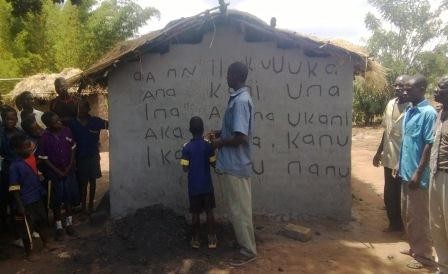
July 2014—In the rural outskirts of Lilongwe, Malawi, a 9-year-old boy named Jofati Levison stands in front of a wall with giant letters written across it. David Kaphikire, a parent from the same village, stands next to him. A crowd gathers as Jofati takes a breath and begins to speak in a loud, clear voice.
Jofati is a student and Kaphikire is a parent in charge of an after-school reading group. They don’t have PowerPoint, and they don’t have the resources to buy a flip chart. But they do have a tall white wall and a nice big pen. By reading the words off the wall, Jofati demonstrates not only his own reading accomplishments, but the dedication of a community that uses every resource at its disposal to teach its children how to read.
Elsewhere in the village, teachers demonstrate lessons and students read texts, selected at random, to show off their new skills.
“We are so proud of our students for being able to read,” declares Billiati Kwachakale, a teacher. “We are demonstrating for others what can be done.”
Jofati was participating in a reading fair hosted by Kadyaulendo School in Lilongwe Rural West School District in December 2013. He is just one of the many children who have benefited from USAID’s Early Grade Reading Activity (EGRA). Parents and teachers have seen significant gains in their children’s skills since EGRA started at the beginning of the school year in 2013.
“I could not believe my ears and eyes,” said Rebecca Akifodi, a mother with three children attending Kadyaulendo, “My child who just started Standard 1 [first grade] was reading better than my child in Standard 4.” She added that, “I went to the school and saw that the EGRA was the reason my child was reading … I wanted to find out how I could help the children who did not have the EGRA to learn how to read.”
With EGRA’s guidance on community mobilization, Akifodi worked with school authorities to form after-school reading groups designed to help children acquire and practice reading skills.
“Children learned to read faster than they ever had before. The whole village was amazed,” said Charity Chadewa, the primary education adviser for the zone where Kadyaulendo School is located. Gesturing to a schoolgirl sitting nearby, she marveled, “Look at Elise Lenadi in Standard 1—she can read fluently!”
Working together and without any outside resources, Chadewa, the parents and the teachers invited the district education manager, teachers from other schools, village heads and community members from other villages, civil servants, parent-teacher associations, school management committees, mother groups and students to witness their children’s success. The reading fair was born.
After seeing children like Jofati at the fair, participants discussed how to ensure that every child attends school and learns to read. Each group made a list of action items related to their children’s learning for which they would assume responsibility. For example, one group decided that parents should be fined one chicken if they do not send their children to school.
“Part of our work plan was to encourage communities to have reading fairs,” said Zikani Kaunda, EGRA’s chief of party, “and we are now seeing schools like Kadyaulendo hosting them on their own. We are confident that this is just the beginning.”
The USAID/Malawi Early Grade Reading Activity is a three-year, $24 million program implemented by RTI International in August 2013. It promotes quality early grade reading instruction, the production of high-quality reading and learning materials in Chichewa and English, improved policy for reading at the national and local levels, and building a community of reading within and outside the school setting. An evaluation is currently under way to measure the impact of this intervention and how household factors and other USAID/Malawi activities affect reading scores in participating schools.
Links
Follow on Facebook







Comment
Make a general inquiry or suggest an improvement.